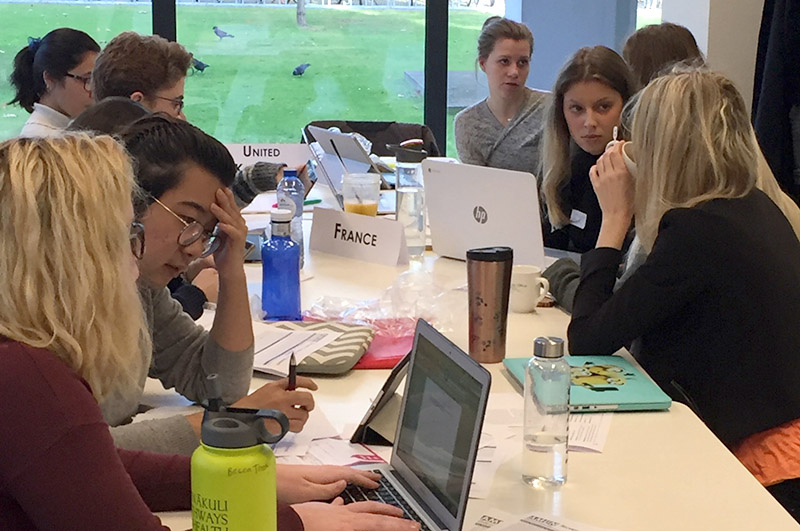In the three years since Denison Seminars have been up and running, students have been inspired to think bigger and delve deeper into topics that might seem oddly disparate or unusually thorny—such as sustainability and the apocalypse, soccer and its cultural implications, or social and political problems with no easy answers.
In autumn 2016, one Denison Seminar course went to the Netherlands, teaming up with students from the University of Tilburg to discuss “Wicked Problems,” a term originally coined in 1973 by two U.C. Berkeley professors of design and city planning to describe types of problems that are not easily defined, and don’t necessarily have solutions that are discoverable.
The phrase “Wicked Problems” is now widely used in the social sciences to describe the stubborn, intractable social problems that are constantly changing, defying simple solutions, and continuing to confront policy makers today. The Denison students quickly realized that wicked problems—such as terrorism, immigration, and climate change—have broad implications and are connected across disciplines and across borders.
“The goal of the seminar was to understand that there are problems that are not solvable.”
As the 2016 U.S. presidential election results unfolded, the perfect backdrop was coincidentally set to discuss such global issues, with a new administration and political party prepared to take the helm of a world power. Suddenly, institutions like NATO, which are often the centerpieces of managing these problems, were facing an uncertain future — in the sense that the U.S. commitment to them was openly challenged and called into question by the new American president.
“After the election, this course became a living lab,” says Katy Crossley-Frolick, the associate professor and chair of political science, who developed the seminar. “It was completely unexpected, but it gave the whole trip, especially to NATO headquarters, a more urgent relevance.”
Wicked problems, by their nature, require collaboration among a variety of stakeholders and need to be looked at from a range of angles. And finding a solution to one part of the problem often creates new problems or exacerbates other parts of the problem.
“I knew that the U.S. plays a huge role in international politics,” says LauraAnn Schmidberger ’18, a junior and biology major from Colorado. “Yet I was caught up in what the Trump presidency would mean for America. Talking to the students from Tilburg helped me understand what it means for the world. It was good to talk with people who were our age and studying similar things as us, but it was really amazing to see our own country from a different perspective.”
Denison Seminars are designed to bring together professors to explore a subject from different disciplines or perspectives combined with an off-campus experience. In this course, Crossley-Frolick teamed up with colleague Dr. Jörg Raab from the University of Tilburg-Netherlands, which recently launched a Bachelor of Science program addressing the global management of social issues, many of which fall under the rubric of “wicked problems.”
During the week-long trip, Denison students participated in group activities on campus with students of the B.S. program in Tilburg. They also toured Amsterdam and Rotterdam together, spent time in Brussels at NATO headquarters and the European Commission for briefings on the migration crisis in Europe, and visited the International Criminal Court and the International Court of Justice in The Hague.
“No matter what side of the election you were on, hearing from the people who work on these issues day-to-day for their entire careers underscored for students that the U.S. has been instrumental and indispensable in the post-war infrastructure of institutions like the EU, NATO, and the UN,“ says Crossley-Frolick. ”And then you have this election, which appears to throw all of that out the window.“
Getting students out of the classroom for a week was undeniably transformative and made a lasting impression on the American students. At NATO, students went through a rigorous security check and had to leave their cell phones behind. At the International Court of Justice, they literally came face-to-face with two men who were on trial for genocide, the worst possible crimes against humanity. It was the kind of full-on experience that could only happen outside the classroom.
“I want students to see that the kinds of questions and problems we were talking about in this course really do have real-world significance,” says Crossley-Frolick. “And when you’re almost touching these issues, it adds a level of understanding. At the same time, it fosters a whole new set of questions.” In preparation for a day-long U.N. Security Council simulation crisis, Denison students were given a two-hour briefing on the Syrian refugee situation by a Dutch expert on peace and security issues, Dr. Sjo Soeters.
Denison and Tilburg students split into groups of 15 different, theoretical countries for the simulation, but no one could come up with a solution for even one minute aspect of the Syrian refugee crisis because of the complex social, economic, and governance factors involved in the problem. And that’s the point.
“The goal of the seminar was to understand that there are problems that are not solvable,” Crossley-Frolick says. “Wicked problems are dynamic and constantly moving, and all that we can really hope for is to manage them on the margins. That’s a hard lesson for anybody to wrap their head around.”
